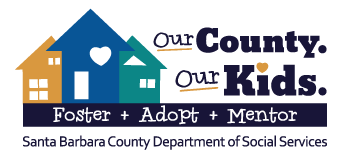
Santa Barbara County recognizes with adoption comes the need for continued supports and resources to help strengthen families with complex needs. The Post-Adoption Services program in Santa Barbara County works to give adoptive families and adoptees access to a wide range of knowledge, resources, and assistance with Adoption Assistance Program (AAP) benefits in order to enhance the long-term stability and real permanence for children and their families.
Post Adoption Services
When contacting Post-Adoption Services it is critical to recognize that the post-adoption social worker’s role will differ from that of a pre-finalization child’s social worker. Upon finalization, all responsibilities and rights rest with the adoptive parent. The post-adoption social worker does not have the same management duties for a child’s case that the pre-finalization social worker for the child did.
The post-adoption social worker can provide valuable insight, suggestions, and support to an adoptive parent who has questions about or is struggling with some aspect of parenting and/or adoption. The post-adoption social worker can provide consultation, answer AAP and adoption questions, assist with information about community resources to address the needs of your child, and can assist in reassessment and renegotiation of your child’s Adoption Assistance Program (AAP) benefits based on the needs of your child within regulatory guidelines. The post-adoption social worker can guide you to supportive crisis intervention services.
If you are an adoptive parent seeking support for a child adopted from Santa Barbara County, an adult adoptee seeking information, and /or a parent of an adoptee please contact the agency at 805-346-7127 and request to speak to the Post-Adoption Services program social worker or adoption supervisor.

Adoption Assistance Program (AAP) Benefits
Post-Adoption services are provided to birth parents, adoptees, and adoptive parents after the adoption is finalized. Services provided by Santa Barbara County’s Post Adoption Services program include the following:
For parents adopting from foster care, adoption subsidies are available to help meet their adopted children’s varied, often costly, needs. Adoption subsidy policies and practices are, for the most part, dependent on the state in which the child was in foster care before the adoption. Adoption subsidies can include a monthly monetary payment and Medi-Cal/Medicaid coverage to meet the children’s physical and mental health needs. An adoptive parent has the option to decline a financial payment and sign a deferred agreement to receive Medi-cal/Medicaid benefits only, or to decline both and sign a deferred agreement allowing future benefits to be reinstated.
The primary function of the county’s Post-Adoption Services program is the facilitation of the Adoption Assistance Program (AAP) for those families who were approved for AAP benefits prior to adoption finalization. The county public agency will reach out every two years (using the AAP 3 form) and inquire if the circumstances of the child and/or family has changed. However, a parent can make a request to the Post-Adoption Services program to renegotiate a change in benefits at any time by phone or in writing.
The Adoption Assistance Program (AAP) is an entitlement program to provide financial and medical coverage to facilitate the adoption of children who otherwise would remain in long-term foster care.
The California State Legislature created the Adoption Assistance Program (AAP) with the intent to provide the security and stability of a permanent home through adoption. Adoptive parents are not recipients of adoption assistance benefits; rather, adoption assistance benefits are made on the child’s behalf to meet their needs. The request for AAP benefits, the eligibility determination, benefit negotiation and execution of the AAP agreement must be completed prior to the adoption finalization.
AAP continues until the eligible child reaches 18 years of age, or in some cases until they reach 21 years of age.

AAP Benefits
AAP continues until the eligible child reaches 18 years of age, or in some cases until they reach 21 years of age.
The benefits available for AAP eligible children are as follows:
- Monthly negotiated financial benefit based upon the special needs of the child and circumstances of the family
- Medical coverage (Medicaid/Medi-Cal)
- Reimbursement of nonrecurring adoption expenses (up to $400 per child per adoption).
- Payment for an eligible out of home placement
- Payment for eligible Wraparound services
- Benefits may continue in a subsequent adoption
- Continues regardless of the adoptive family’s state or country of residence
- If eligible, benefits may continue to age 21

Adoption Assistance Program (AAP)
The following questions and/or requests should be directed to the Post-Adoption Services Program managing the AAP case:
- Update contact information and mailing address
- Update changes in the family circumstances
- Request a renegotiate of the AAP benefit
- Payment for an eligible out-of-home placement.
- Request an eligible age/or age needs to increase
The amount of financial AAP benefit:
The AAP benefit is negotiated between the public agency and parents and is based on the child’s needs and circumstances of the family, which is limited to the amount the child would have received had they remained in foster care (not including foster family agency rates). The child may qualify for a Special Care Increment (SCI) in addition to the AAP basic rate if their needs require a higher level of care and supervision. A child who is eligible for California Regional Center Services (CRC) due to developmental delays may receive the dual agency rate plus a supplement to the rate, if applicable.
Detailed information regarding the California State Adoption Assistance Program can be found at North American Council on Adoptable Children (NACAC).

Request for Contact and/or Adoption Information Post-Adoption
Request for non-identifying information from adoption records
If you are an adult adoptee, the agency can provide you with non-identifying information about your adoption. Adoption records are kept forever and sealed when an adoption is final. Adult adoptees have access to some limited information. The information that can be provided includes general facts about the birth parents and their medical history (if known). You may request this information by writing directly to Santa Barbara County DSS, adoption services. Your letter must include your name, date and place of birth, and your adoptive parents’ full names. A Notary Public must notarize your signature. The request can be sent to:
Santa Barbara County Department of Social Services, Adoption Division
2125 S. Centerpointe Parkway
Santa Maria, CA 93455
Contact:
In accordance with California law, Santa Barbara County may help adult adoptees adopted from Santa Barbara County and their parents facilitate contact with each other. California Law requires a notarized AD 902- Consent for Arranging Contact, be in the adoption case file for each party, birth parent and adult adoptee, in order to facilitate contact. The only information to be provided, with notarized consent, is the last known email address and/or phone number indicated on the form.
Santa Barbara County can disclose sibling information to an adult adoptee and adult sibling of an adoptee according to California Law. A notarized AD 904A-Waiver of Rights to Confidentiality for Siblings, for each adult sibling must be in the adoption case file in order for the agency to share information. A notarized AD 904B- Waiver of the Rights to Confidentiality for Siblings- Under the age of 18, must be completed as directed in order for the agency to share contact information of sibling adoptees and siblings under the age of 18. The law prohibits the CDSS and licensed California adoption agencies from soliciting consents and providing search services for adoptees or birth parents.
Disclosure of Name and Address:
The California Department of Social Services (CDSS) or the licensed California adoption agency that handled the adoption can disclose the name and address of birth parent(s) to adult adoptee’s who have reached the age of 21, if the following conditions are met:
- The birth parent signed a relinquishment or consent for adoption, or the parent’s rights were involuntarily terminated by court action on or after January 1, 1984, and
- The birth parent signed an Adoptions Information Act Statement (AD 908) form granting permission for such disclosure.
- The adoptee has submitted an Adoptions Information Act Statement (AD 908A) form requesting disclosure of the name and address of his or her birth parent(s). The adoptee must be 21 years of age or older in order to complete the AD 908A.
You can find additional information by going directly to: http://www.cdss.ca.gov/Adoptee-information
Updating of adoption records:
Adoption records will be updated with current address and other information received from birth parents and adoptees upon request.
